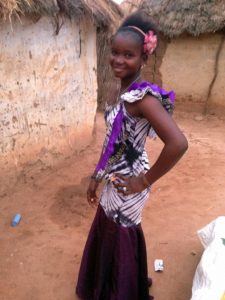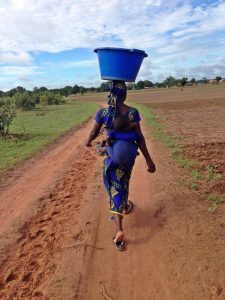This project is made possible through the partnership of WATER CHARITY and the NATIONAL PEACE CORPS ASSOCIATION. ![]()
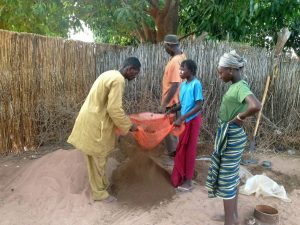 Location
Location
Village of Padaf, Commune of Kaymore, Department of Nioro Du Rip, Kaolack, Senegal
Community Description
Padaf is a relatively small village in the southeast corner of Kaolack, Senegal. Depending on the season, the village is inhabited by roughly 1,000-1,200 people.
All of the village residents speak Wolof, and some speak Pular. The village currently has one school that teaches French, science, math, geography, and physical education. Most families rely on agriculture as their main source of food and income.
With the help of Feed The Future, the community was able to build four chicken coops and equip them with materials, chickens, and feed. The chickens raised during the first round were sold at a profit.
Problem Addressed
The major problems in the community are that the school does not have water, there is no working community garden and no immediate access to vegetables.
The school is on the outskirts of the village and is not close to any water source. The school bathrooms are also in need of some serious repairs. Since there is no community garden, there is not a formal place for children or community members to learn gardening techniques and practices.
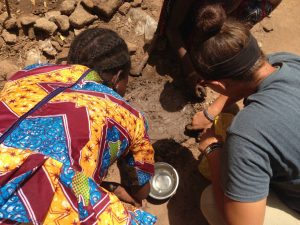 Finally, the village is split into four sub-sections, and one of those sub-sections does not have a water source. Everyday women from this part of the village walk long distances to a water spigot or well in another part of the village. This takes a lot of their time and energy, which could be used elsewhere.
Finally, the village is split into four sub-sections, and one of those sub-sections does not have a water source. Everyday women from this part of the village walk long distances to a water spigot or well in another part of the village. This takes a lot of their time and energy, which could be used elsewhere.
Project Description
This project is to (1) extend the water line to the school, (2) repair the school bathroom, (3) create a school garden, and (4) provide water to an unserved part of the village. The work will be coordinated by the Padaf School Board and the PCV.
The existing water line will be extended to reach the school, giving students and teachers access to fresh, clean water.
The building that houses the two bathrooms at the school will be repaired.
A school garden will be created to give the kids a productive place to learn a skill that they can keep with them and use it for the rest of their lives. Each year, 70+ children attend the school and will be working in the garden. In addition, members of a young girls club that was started by the PCV in the community will have the chance to learn and work there.
Goods that are produced in the garden will be sold in the community to help the school pay for supplies and small maintenance, as well as garden maintenance. Long term, the school would like to implement a school lunch program. Having a garden with fresh vegetables would make that much more feasible for them, and would ensure that children are getting at least one balanced meal a day.
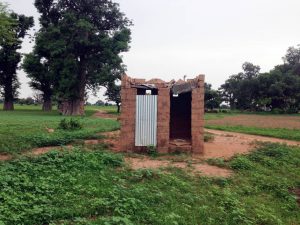 The project will also provide one area of the village that currently does not have a water source with a connection to clean water. This waterline will supply upwards of 200 women, men, and children with clean water much closer to their homes.
The project will also provide one area of the village that currently does not have a water source with a connection to clean water. This waterline will supply upwards of 200 women, men, and children with clean water much closer to their homes.
There have been many meetings thus far figuring the logistics of the project. Suppliers and specialists who will be working on the different elements in the project have been contacted.
Once work begins, community members will come together for the physical labor, including digging trenches, making bricks and digging holes for fence posts, and generally providing all unskilled labor.
A specialist for water line installation, a mason for bathroom construction, and a business that specializes in chain-link fencing have all been lined up.
Water Charity funds will be used for purchasing materials, including fencing, fence posts, water pipes, garden tools, and cement, as well as material transportation costs, as most materials must be purchased in the city about 50 miles away.
Project Impact
300 people will benefit from the project.
Peace Corps Volunteer Directing Project
Abby Evans
Monitoring and Maintenance
The Padaf School Board and the PCV will provide monitoring of the work and of the improvements after construction.
Comments
Having access to water and a clean, safe bathroom is especially important for young girls in order to feel comfortable and safe attending school while they are menstruating.
The newly available water will ensure the success of the garden, which will provide nutritional and economic benefits.
Installing a spigot in the sub-village common space will allow the women in this area more time and energy to be put into other activities in the home and in their work.
Fundraising Target
$1,800
Funds raised in excess of the project amount will be allocated to other projects in the country.
Donations Collected to Date
$1,800
Dollar Amount Needed
$0 – This project has now been fully funded through the generosity of the Robert Victor Sager and Beatrice Mintz Sager Foundation.
Additional donations will be used for other projects in Senegal.
